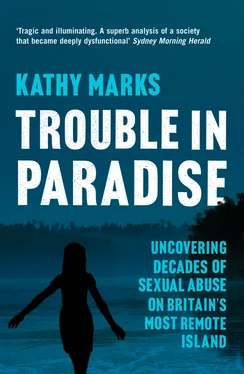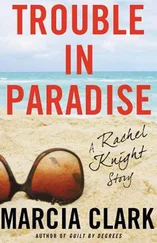1 ...7 8 9 11 12 13 ...20 Carnihan and her husband, Daniel, had been attracted by the idea of living in such an isolated spot. But they found life on the island numbingly ordinary. ‘All the stuff we were told about it being such a wonderful, caring place turned out to be rubbish,’ she told me in 2005. ‘There’s no real community spirit. And it’s not exotic: it’s like any small town. The only difference is you can’t escape.’
From the start, the teacher had a nagging sense that something was ‘not quite right’ with the children. Six- to eight-year-olds in her class talked about boyfriends and girlfriends in a way that seemed, to her, precocious. When Carnihan’s own family got to Adamstown, a boy slightly younger than her 11-year-old daughter, Hannah, told the girl, ‘You’re mine.’ Another boy said the same thing to Carnihan’s other daughter, nine-year-old Adie.
About halfway through her two-year posting, she overheard a snippet of conversation between two schoolgirls, aged 11 and 13, who were sitting on a verandah outside the classroom. ‘You’ll be 12 next week, you know you’ll be old enough for it?’ the older pupil asked her friend.
From what she had seen and heard, Sheils Carnihan already suspected that girls on Pitcairn were considered ‘fair game’ once they turned 12. This little exchange seemed to confirm that. ‘I was appalled,’ she says. ‘The older girl knew her friend would be expected to have sex. She was making sure she understood what her birthday meant.’
Carnihan was particularly worried about two 13-year-old girls, Belinda and Karen, who seemed extremely troubled. They would ‘talk about sexual things and then giggle and be secretive, or make quite blunt sexual comments’, she says. Soon after the teacher’s family arrived, Belinda jumped onto Daniel’s knee and snuggled up to him in a suggestive fashion.
Once Carnihan had occasion to reprimand Karen for bullying, and the girl’s emotional reaction startled her. ‘She was really angry with me, she was crying and told me that I didn’t understand. She said I didn’t know what it was like to be made to be friends with someone or else they would beat me up.’ Perturbed by these incidents, she confided in Meralda Warren, the police officer, and in the Seventh-day Adventist pastor, John Chan, the only other outsider. Meralda, she says, dismissed her concerns, while Chan’s response was that ‘the morals [on Pitcairn] are quite loose, but you don’t do anything about these things’.
During Sheils Carnihan’s stay, Chan, an Australian, was succeeded by a South African-born pastor, Neville Tosen. Before long, Tosen came to share her unease. ‘But we didn’t know what to do about it,’ she says. ‘We didn’t have any evidence. It was just a gut feeling. And we didn’t feel we could ask the girls yet.’
Even as Carnihan agonised about what to do, her own daughters were forming friendships that would be crucial to this case. Hannah and Adie got to know Belinda and Karen, as well as other girls, and went on camping trips with them around the island. During those trips, the adolescents shared their secrets.
Just as for the Carnihans, Pitcairn was not what Neville Tosen had expected. Brought up on tales of a beacon of faith in the Pacific, he had been looking forward to ministering to a community of committed Adventists. However, when he arrived in late 1998 with his wife, Rhonda, he discovered that only a few people went to church—and they were not exactly glowing advertisements for the religion they professed to practise. Tosen was dismayed to learn that adultery was rife, and that churchgoers were also involved in dubious financial dealings. He delivered a few blunt sermons, ‘and we weren’t too popular as a result’, he says. ‘No one had ever told Church members to pull their socks up before. It caused quite a stir. But nothing changed.’
One islander warned him, ‘There’s more to come.’ And Tosen feared that he knew what the man meant. ‘I’ve been a teacher most of my life, and we immediately picked up mood swings,’ he says. ‘One day a certain student will be friendly to you, the next day totally withdrawn. It took me three months. I said, “Wait a minute, these kids are being abused.” When I tried to talk about it, everyone just clammed up, including the kids themselves.’
He and Carnihan agreed to keep a careful eye on the situation; meanwhile, Tosen examined the birth records that were kept in the island secretary’s office. They revealed a pattern: most Pitcairn women had their first child between 12 and 15. The pastor, who spoke to me at his home in Queensland in 2005, raised the subject at a meeting of the island council. One councillor, Tom Christian, who had four daughters, replied, ‘The age of consent has always been 12, and it’s never hurt them.’ Neville Tosen, who had worked all over the Pacific, says, ‘I remember getting quite hot and saying that even the Kanakas of Western Guinea had 16 as an age of consent. Tom got very angry. He called me a racist, and accused me of interfering in island politics.’
Tosen went on, ‘Steve [Christian] also spoke up, saying it was their Tahitian culture and sometimes the girls couldn’t even wait until they were 12. Everyone else at the meeting was very quiet, including Jay, who was mayor then. The only person who supported me was Brenda [Steve’s sister]. She said, “Any man that does that to a 12-year-old deserves to be knackered.”’
When Gail Cox returned to Pitcairn in October 1999 to conduct her second block of training, she found a community at war with itself. Things were very different from her first visit, and she was different, too. Dennis McGookin, her boss, had instructed her to be a police officer, not the islanders’ friend.
The first problem she had to deal with was theft, particularly of government property, which she discovered was widespread and had been going on for years. Diesel fuel was siphoned off into quad bike tanks; timber, roofing iron and fuse boxes vanished as soon as they were unloaded at the wharf; cement for the slipway ended up as a swimming pool in someone’s garden. Electrical equipment and a computer had been stolen. People jokingly referred to one Adamstown home, which was built entirely from pilfered materials, as ‘Government House’. ‘They don’t see it as stealing,’ one outsider told me later. ‘In their minds, everything that arrives on the island is Pitcairn property.’
British officials ordered the policewoman to crack down. She questioned all of the islanders, and nearly everyone, even the elderly folk, owned up to something. One man confessed to stealing NZ$20,000 (£7,500) from the co-operative store. At the suggestion of diplomats in Wellington, Cox offered the locals an amnesty, which they accepted. ‘But they weren’t happy with me challenging them like that,’ she says.
Six weeks or so after Gail Cox returned, Sheils Carnihan’s two-year posting was up. Two days before the family left, 13-year-old Hannah spoke to her mother, disclosing the explosive information that Belinda and Karen, her friends on the island, had confided months earlier. Both girls, allegedly, had been sexually assaulted by Randy Christian, the burly 25-year-old who was Steve’s middle son. Carnihan straight away told Gail Cox, who notified British diplomats in Wellington as well as the Commissioner, Leon Salt.
According to Hannah, Belinda, in particular, was ‘dying to tell’ her mother about Randy, but could not summon up the courage. She even begged her friends to speak to her mother on her behalf, and wrote her a letter, which she then burnt. Belinda was anxious about damaging the friendship between her family and Randy’s, and was sure her mother would not believe her. Hannah told Sheils, ‘She wanted to write to her mum saying what had happened, and that she wanted it to stop. I mean, if her mum knew, maybe it would.’ To which Neville Tosen comments, ‘How the mother didn’t already know about it—I’ve never answered that question. Because from my rather limited access to the girl, I was aware that she’d been interfered with.’
Читать дальше












